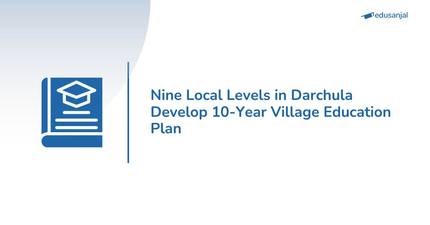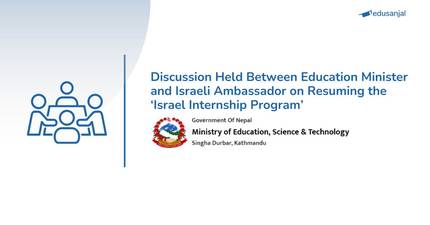Nepal Government has unveiled a substantial budget of Rs 197.29 billion for the fiscal year 2080-81 BS for the Education sector, showcasing a mix of ambitious initiatives and critical concerns to address the country's educational landscape. While appreciating the increased investment in education, there remains a need to assess the implementation and effectiveness of these measures carefully.
Acknowledging the pivotal role of education in driving progress and prosperity, the government's decision to allocate a significantly higher budget of Rs 197.29 billion, amounting to 11.26 percent of the overall budget, compared to the previous fiscal year, demonstrates a commendable commitment to fostering educational development. This increased allocation reflects the recognition that a well-funded education sector is crucial for the nation's growth.
Residential Schools in Remote Regions
One noteworthy initiative announced in the budget is the establishment of residential schools in remote and mountainous areas. Inspired by successful institutions like Budhanilkantha School and Gandaki Boarding School, the government's plan to set up model residential community schools in Dhankuta, Bardibas, Tansen, Surkhet, and Dadeldhura shows a proactive approach to ensuring educational access for children from underserved regions. However, it will be critical to closely monitor the implementation and effectiveness of these schools to ensure they deliver the desired outcomes.
Efforts and Inclusivity and Emphasis on Mother-Tongue
The budget's emphasis on providing education in mother tongues and the allocation of scholarships worth Rs 3.02 billion for marginalized communities, including poor Dalit students, are positive steps towards inclusivity.
Acknowledging the significance of language in education, Finance Minister Dr. Mahat announced the allocation of funds for feasibility studies and the provision of education in mother tongues. The government aims to create an education system that caters to the population's diverse needs. However, careful evaluation and monitoring of these initiatives will be essential to ensure their equitable distribution and long-term impact.
President's Educational Reform Program and Education Technology
The President's Educational Reform Program will be vital in the upcoming financial year. The program will focus on constructing school buildings with advanced technical infrastructure for 1,200 community schools, ensuring a conducive learning environment for students across Nepal. With an 8 billion 88 million rupees allocation, this initiative aims to provide students with improved facilities and resources to enhance their educational experience.
Similarly, recognizing the importance of digital learning, the program will allocate 100 million rupees to provide digital learning materials to students. This includes purchasing internet connectivity, digital boards, and other necessary materials for 20 selected schools in each province. Through virtual teaching conducted by expert teachers in English, mathematics, and science subjects, students can access quality education regardless of their geographical location.
Technical and Vocational Education
The program aims to revamp the Technical and Vocational Education Training Council to strengthen technical and vocational education. This regulatory body will be developed as a separate entity to ensure high-quality training programs and effective implementation. The expansion of technical schools is also a priority, as these institutions are considered a cornerstone of prosperity. By mapping and adjusting existing technical schools, their reach will be extended and transferred to the respective provinces. An allocation of 8.3 billion rupees has been made to support technical and vocational education and training.
Nutritional Health and Sanitation
Health and nutrition play a vital role in a student's overall well-being and academic performance. Allocating Rs 8.45 billion to promote mid-day meals and banning junk food during lunchtime demonstrate a commendable focus on fostering healthy habits among students. It is estimated that approximately 3.2 million students will benefit from this program.
Additionally, the budget has allocated Rs 1.42 billion to provide free sanitary pads and announced plans to link traditional education systems with formal education. While applauding the government's efforts to connect traditional education systems with formal education and allocate funds for free sanitary pads, it is essential to ensure the successful integration of these initiatives. Collaboration between traditional and formal education systems must be carefully coordinated to create a cohesive and comprehensive learning experience. Furthermore, the provision of free sanitary pads should be accompanied by educational programs that address menstrual hygiene management to maximize its impact.
Teachers from Diverse Educational Backgrounds
In a significant reform, the government introduced a new provision allowing individuals from various educational backgrounds to participate in the teaching license examination. Previously, only those with an educational background were eligible to take the examination. The budget speech also highlighted plans to promote qualified teachers to vacant upper-level positions and implement skill tests for self-declared human resources who have acquired skills domestically or abroad. Allowing individuals from diverse educational backgrounds to participate in the teaching license examination is a positive step toward diversifying the teaching workforce. However, ensuring rigorous standards and quality assurance in the teaching profession remains essential to maintain the integrity and effectiveness of the education system.
Measures to Improve Higher Education
The budget's commitment to restructuring the University Grants Commission, implementing an annual academic calendar, and allocating funds to the Research Center of Tribhuvan University showcases a commitment to higher education. However, ensuring that these reforms are accompanied by comprehensive strategies to enhance research quality, innovation, and the overall academic environment will be crucial.
To foster research, innovation, and creativity in the education sector, the Ministry of Education, Science, and Technology will establish a separate unit dedicated to research and innovation. A budget of Rs 1 billion has been earmarked to establish a research, innovation, and innovation fund.
Drawbacks of the Budget 80/81 on Education Sector
Insufficient Allocation for Infrastructure Development
One of the significant drawbacks of the budget is the need for sufficient allocation for infrastructure development in the education sector. To provide quality education, it is crucial to have well-equipped schools and educational facilities. However, the budget must address the pressing need for infrastructure improvements, such as building new schools, renovating existing ones, and providing necessary resources for effective teaching and learning.
Limited Focus on Vocational and Technical Education and Educational Technology
While the budget emphasizes the importance of technical education, a limited allocation is dedicated explicitly to vocational and technical training programs. According to the budget, technical and vocational education and training would be supported with an allocation of 8.3 billion rupees. Given the evolving job market and the demand for skilled professionals in various sectors, a stronger focus on vocational education would better equip students with practical skills and enhance their employability prospects.
While the budget allocates funds for digital learning materials in selected schools, the overall investment in educational technology infrastructure and resources is inadequate. Providing access to technology-enabled learning tools and resources for a broader range of schools and students would help bridge the digital divide and enhance learning outcomes.
Inadequate Teacher Training and Professional Development
The budget fails to allocate significant funds for teacher training and professional development programs. Ensuring the quality of education depends on well-trained and motivated teachers. Without adequate support for continuous training and professional growth, the education system may struggle to meet the evolving needs of students and effectively implement modern teaching methodologies.
Neglected Early Childhood Education
The budget does not prioritize early childhood education, which is critical in laying the foundation for a child's future learning and development. Investing in early childhood education is crucial for promoting cognitive, social, and emotional growth. Still, this area's lack of substantial funding hampers providing quality early education programs.
Insufficient Support for Special Needs Education
While the budget mentions sign language and braille textbooks for students with disabilities, there is a lack of comprehensive support for special needs education. Additional resources and trained personnel are required to create an inclusive learning environment and provide tailored support for students with diverse learning needs. The budget could have allocated more funds to enhance the accessibility and inclusivity of the education system.
Limited Emphasis on Research and Innovation
The budget does allocate some funds for research and innovation; however, the allocation is relatively small compared to the overall education budget. Encouraging research and innovation in education is crucial for advancing knowledge, improving teaching practices, and developing new educational technologies. More significant investment in research would contribute to the overall improvement of the education sector.
While commending the Ministry of Education, Science, and Technology for its ambitious plans and increased budgetary allocation, it is imperative to maintain a critical lens and monitor the implementation of these initiatives. This balance will help to ensure that the allocated resources are effectively utilized, potential challenges are identified and addressed promptly, and the education sector in Nepal can genuinely thrive, providing opportunities for all.













